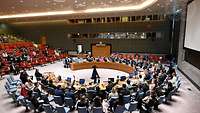
Security Council Committee pursuant to resolution 1718 (2006)
Web page and documentation of the UNUnited Nations sanctions against North Korea


The vessels of the German Indo-Pacific Deployment 2024, together with partners, monitor the United Nations sanctions against North Korea’s nuclear and missile armament. The frigate “Baden-Württemberg” and the replenishment ship “Frankfurt am Main” are the eyes and ears of international law enforcement. What are the most important aspects of this multinational cooperation?
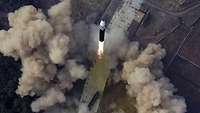
Symbol of confrontation: launch of a Hwasong-17 intercontinental ballistic missile, a photo published by the North Korean news agency KCNA in March 2022 on the occasion of a recent test
image source: Nippon.com (accessed: 9 September 2024)North Korea has been developing nuclear weapons since the 1980s. In 2006, the country detonated its first nuclear bomb in an underground test. Today, experts estimate that it has produced up to 90 warheads.
At the same time, North Korea has built up a stock of medium and long-range missiles, which it continues to develop further. The latest model, Hwasung-17, an intercontinental ballistic missile, is said to have a range of 15,000 kilometres. This would allow North Korea’s potential nuclear weapons carrier to reach North America and Europe.
North Korea’s neighbors South Korea and Japan in particular perceive this development as an ever-increasing threat. From the perspective of South Korea, because the now democratic state has been in a serious conflict with the totalitarian dictatorship since 1950. Also from Japan’s point of view: because the trajectories of many North Korean missile tests ran across the country. The untested missiles could have crashed over the densely populated Japanese islands during their unannounced tests.
The international community – both the United Nations and, above all, the USA as the most important ally of South Korea and Japan – have reacted to North Korea’s nuclear build-up in two ways. On the one hand, there have been various diplomatic attempts to dissuade North Korea from its confrontational course.
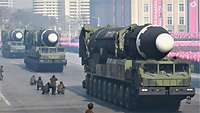
Threatening gesture of a dictatorship? Hwasong-15 ICBMs at a parade. This predecessor of the Hwasong-17 is believed to be the first to reach mainland North America from North Korea. Photo by North Korean news agency KCNA
image source: missilethreat.csis.org (accessed: 9 September 2024)On the other hand, the UNUnited Nations have imposed increasingly extensive sanctions since 2006 in order to exert more and more pressure upon the country. It started with Security Council Resolution 1718: the ban on importing or exporting relevant nuclear and missile technology. Today, North Korea is no longer allowed to participate in the international arms trade, is no longer allowed to export raw materials, and is only allowed to import a maximum of 500,000 barrels of oil per year.
A committee of the UNUnited Nations Security Council has been responsible for monitoring the comprehensive sanctions since 2006. Its member states provide it with national means of monitoring and enforcement. This is the basis of the Pacific Security Maritime Exchange, or PSMX for short – a partnership of the USA with South Korea, Japan, Canada, New Zealand, France, United Kingdom and Germany.
“The PSMX is a cooperative network of allies and partners and a symbol of the shared commitment by PSMX members to uphold international law, rules, and norms” says the USUnited States Department of State, describing the group of countries that jointly monitor the air and primarily the maritime space around the Korean peninsula.
“The USUnited States have been relying on such small, minilateral initiatives with only a few partners in the Indo-Pacific, especially since the Biden administration,” says Eric Ballbach, North Korea expert at Berlin-based think tank Stiftung Wissenschaft und Politik, describing this network. “They are specifically looking for compatible participants. These include, for example, the Australian-American-British security partnership AUKUSAustralia, United Kingdom, United States and the economic initiative IPEF, Indo-Pacific Economic Framework for Prosperity. Germany’s participation in the PSMX is an important signal for all partners in the region.”
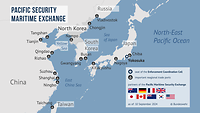
Main operational area for sanctions monitoring: the North-East Pacific Ocean
BundeswehrA panel of experts had been working for the UNUnited Nations Security Council since 2009. It submitted an annual report to the Council based on a variety of data sources and fact-finding trips. In March 2024, council member Russia no longer agreed to extend its mandate. “International interest to monitor what is going on still remains,” explains Ballbach. “The Panel of Experts cannot be replaced, but the PSMX remains an important instrument. Because sanctions monitoring thrives on information and it continues to flow.”
Smuggling takes place in the Yellow Sea, the East China Sea and the Sea of Japan, with which the North Korean regime is breaking international law and the sanctions imposed. Weapons from North Korea end up abroad illegally, and oil in particular flows in the opposite direction. The means of transport for this are merchant ships, whose owners and origins are concealed through shell companies and secret exchanges on the high seas. The regime in North Korea has also become increasingly closely intertwined with organized crime in East Asia since the first UNUnited Nations sanctions were imposed.
Warships and naval aircraft from PSMX partners are primarily on the trail of ghost ships off the coasts between Korea, China, Taiwan, and Japan. At the high seas crime scene, they primarily document ship movements throughout the region, which serve as clues and evidence to the complex smuggling networks.
To do this, the sailors first build up a maritime situation picture: Who is traveling in the sea area, coming from where and going where? A common practice is for a shell company to charter a tanker on behalf of North Korea. This vessel prefers to bunker oil acquired on the black market and later meets up with another tanker from North Korea to hand over its cargo. This takes place on the high seas, where no law enforcement agencies would have easy access. Both ships make sure there is no other vessel in sight and have their automatic identification signal turned off to hide from outsiders.
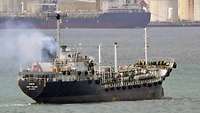
Confirmed suspect: The tanker “Unica” is one of the many ships that were involved in North Korea’s oil smuggling operations. Its activities were first uncovered in 2021.
image source: marinetraffic.com (accessed: 9 September 2024)As a rule, smuggling works well in the vast sea area in a wide arc around Korea and away from the main trade routes – unless there are reconnaissance aircraft or warships and their ship-borne helicopters nearby. They then collect the photographic evidence of the secret meeting. Reconnaissance satellites, on the other hand, can only provide initial information so that such resources may be used specifically for detailed recordings.
Once individual ships have been identified and the illegal oil transfer between the two has been documented, those monitoring the sanctions can follow the trail and take action against those behind them. Consequences include, for example, that the vessels involved will be internationally banned from calling at commercial ports via sanctions lists, and that they can be confiscated by local authorities if they violate the rules. In addition to those ships, there are also people and organizations on the lists of the UNUnited Nations, but especially of the European Union.
Boarding and checking of ships in the high seas, a procedure such as the EUEuropean Union’s Operation Irini in the Mediterranean, is not provided for by the UNUnited Nations sanctions against North Korea. Their main purpose, besides collecting data, is to increase the cost of breaking them, according to Eric Ballbach. “The more complicated the smuggling has to be, the more expensive it becomes,” says the scientist. “This keeps strong pressure on North Korea. Last but not least, it sends a signal that the international community knows exactly what the regime in Pyongyang is doing. Sanctions monitoring thrives on information.”
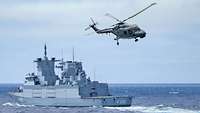
Frigate “Baden-Württemberg” and her longest-range reconnaissance asset: the Sea Lynx ship-born helicopter
Bundeswehr/Philipp SchäferThe most important working muscle of the PSMX is the Enforcement Coordination Cell, or ECC for short. The USUnited States already set it up in 2017 in order to make previous sanction measures more effective. The ECC is situated with the 7th USUnited States Fleet at its base in Yokosuka in Tokyo Bay. The military-technical infrastructure being provided here by a command network makes it possible to assemble and assess the data collected at sea.
Around 50 staff delegated by the PSMX partners collect reports, so-called post mission products, from the naval vessels involved in sanctions monitoring about the operations and oberservations they have carried out. They present their assessnents to the PSMX partner governments, which in turn present them to the UNUnited Nations Security Council Committee on North Korea Sanctions.
It is important to know that the UNUnited Nations sanctions against North Korea – although so extensive – do not mean an actual blockade of the country. Legal shipping traffic still passes through the region as well as it originates from and calls at North Korean ports. This include, among other things, aid deliveries for the country suffering from food shortages, but also limited permitted imports of oil. The UNUnited Nations Security Council also grants exemptions in individual cases, such as for the import of fertilizers.
In general, there is a lack of international consensus for a fully comprehensive monitoring of the sanctions, including the physical control of all ships in the region. Russia in particular is currently benefiting from importing ammunition from North Korea while it is waging war in Ukraine. “Moscow is now openly breaking the sanctions,” says Ballbach.
China’s relationship with the UNUnited Nations sanctions, which it helped decide on, is particularly difficult. On the one hand, it is concerned about a destabilization of the overall security situation in East Asia, which could triggered by North Korea’s uncontrolled nuclear and missile armament. On the other hand, Beijing supports the regime in Pyongyang in order to prevent Korean reunification and not to lose North Korea as a buffer zone against its ideological opponents South Korea and the USUnited States.
“The Chinese leadership itself has said that it will give North Korea enough to survive, but not to prosper,” says Ballbach, summarizing this two-pronged policy. “But Beijing’s top priority is to avoid instability.”
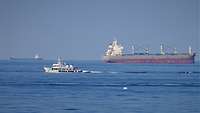
Operational area East China Sea: Those monitoring the sanctions must find violators among the legal maritime traffic of the region
Bundeswehr/Leon RodewaldIn 2021, Germany took part in monitoring the UNUnited Nations embargo against North Korea for the first time with frigate “Bayern” during her Indo-Pacific deployment. The vessel was operating in the sea area west of Japan between mid-November and mid-December, working for the ECC. The same applies this year to frigate “Baden-Württemberg” and the replenishment ship “Frankfurt am Main”. They contribute to the PSMX situation report between mid-August and mid-September.
by Marcus Mohr email